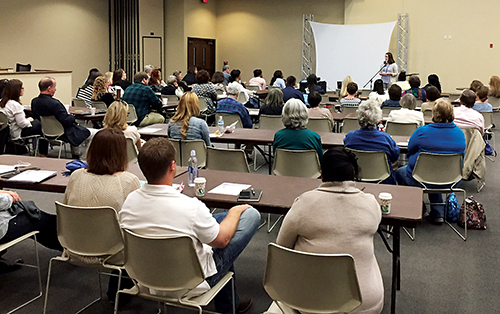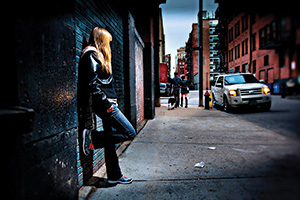By Maureen Smith
JACKSON – More than 70 people gathered at Christ United Methodist Church on Saturday, April 9, for a one-day conference on human trafficking with a focus on Mississippi and the Jackson area. The event brought together law enforcement personnel, teachers, clinicians, childcare and non-profit workers and concerned people. Two presenters spoke about how to recognize trafficking and how to help the victims and local organizations shared what they are doing to address the issue.

Almost 80 people attended a one-day human trafficking workshop at Christ United Methodist Church in Jackson. Organizers hope to use the awareness to spur action on the issue (Photos courtesy of Debb Tubbs)
Debb Tubb, communications director for Christ United Methodist Church, attended an awareness gathering last year called “Not in my city, not in my state.” “After I heard the stories I just had to ask myself, what is the next step?” She started speaking with Courtney Layson, the counselor on staff at the church, and they came up with this workshop in partnership with several other organizations. Ashleee Lucas, a representative from Shared Hope International, partnered with the church to identify speakers.
Last year, Belhaven University conducted a rapid assessment of domestic minor sex trafficking (DMST) in Rankin, Hinds, Madison and Warren counties. The report found that while awareness of this issue is on the rise, there is a tremendous amount of work to be done. “The consensus is that central Mississippi is not equipped to care for victims of child trafficking. There are no shelters that specialize in the needs of DMST victims. Many victims slip through the cracks or are mislabeled as juvenile delinquents because some first responders do not recognize the profile of a DMST victim,” reads the introduction.
The report goes on to explain that the most common kind of trafficking found in Mississippi is perpetrated within families – with relatives offering children to predators in exchange for drugs, money or goods. In some cases the victims are charged with crimes rather than being protected or rescued from their situations. Awareness within the community, training first responders, laws that specifically protect and address this issue and funding for treatment and training are all needed, according to the report.
People who attended the conference heard from Elizabeth Scaife, director of Shared Hope International, and Dr. Rebecca Johnson, of International Justice Mission. Sessions included training on profiling traffickers and victims, understanding the trauma the victims undergo “with our heads and our hearts,” gang trafficking and trauma care for victims. Local organizations involved in starting to address this problem were also on hand. A couple from Crossgates Baptist Church talked about their effort, Ministry 639, which offers care-package backpacks to suspected victims and tries to offer them resources.
Tubb said she was surprised about some of what she has learned about trafficking. “Just for me it was disturbing to learn that during the golf tournament that brought so many people to town the ‘back pages’ ads spiked,” she said. Back pages are websites known for offering prostitutes, often minors. “When events bring people to the area – how can we respond to that?” asked Tubb. The Belhaven report backs up that data. “…the face of prostitution and commercial sex is changing with technology. Many websites allow facilitators to advertise without ever walking the streets. Law enforcement identified the Internet as the main source for locating victims,” says the study.
Tubbs also learned that the profile of the “john” or customer is not what many people have in mind. “It’s not just what you might think of as a ‘sleazy hotel,’ it can happen at nice hotels and conference centers. White collar professionals feed money into the industry,” she said. Training law enforcement and supporting prosecution for the customers can help as well as offering treatment for men with pornography and sex addictions.
The workshop was just the start of raising awareness. “We have identified people interested in this ministry,” said Tubb. The next step is to process what they heard and have a follow-up meeting. “Anyone who wants to partner in this is welcome,” she said. Those interested can contact Christ United Methodist Church at 601.956.6974
Read the Belhaven Rapid Assessment online, https://sharedhope.org/wp-content/uploads/2015/03/MS-Rapid-Assessment-22715.pdf.
(Editor’s note: April is National Child Abuse Awareness Month. Mississippi Catholic will feature abuse awareness and prevention stories in each issue this month.)

